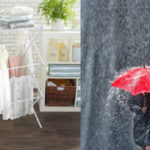Avoid These Things When the Weather Is Humid
Open the windows: Some people think this will help the moisture escape, however, if the weather outside is also humid, the moisture from outside will seep in, making the house even more damp.
Clean the house with a damp cloth: Cleaning the house with water when the air is already saturated with moisture will not make the floor drier, it will only increase the amount of water on the surface, prolong the drying time, and increase the risk of mold and mildew.
Close the doors and turn on the fan: People often think that this will help dry out the air. But in reality, turning on the fan does not help remove the moisture when there is no air circulation. As a result, more water vapor condenses, increasing the humidity.

What to Do When the Weather Is Humid to Keep the House Dry
Use materials with high moisture absorption: Easy-to-find materials such as dry charcoal and old newspapers can be used to absorb moisture in areas prone to water buildup, such as corners of the house and kitchen. In addition, if your house allows it, consider purchasing an electronic dehumidifier for the mezzanine and prefab houses.
Clean the house with a dry cloth: Many housewives tend to use hot water for faster drying. However, this practice is not applicable during humid weather. Use a dry cloth with good absorbency to clean the house instead.
Set the air conditioner to dry mode: Arrange ventilation fans in the kitchen and bathroom for better air circulation. Reduce indoor humidity with dehumidifiers and air conditioners. The ideal humidity level is around 40 – 60%.
Prevent mold and mildew in the wardrobe: Wardrobes made of wood or plywood are prone to mold. To prevent clothes from getting moldy and smelly, use moisture absorbers to control this condition.
Use newspaper to prevent humidity: In damp areas like the kitchen wall or near the sink, water can seep in, making the walls damp. Use newspaper to stick on the damp walls to absorb moisture. This method is relatively cost-effective and efficient.
Light candles inside the house: Using scented candles not only helps reduce the humidity in the house but also creates a more relaxed atmosphere. Give it a try, it’ll be very effective.





































